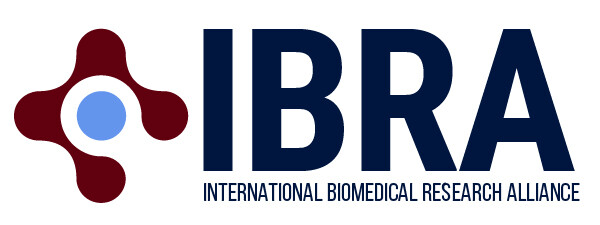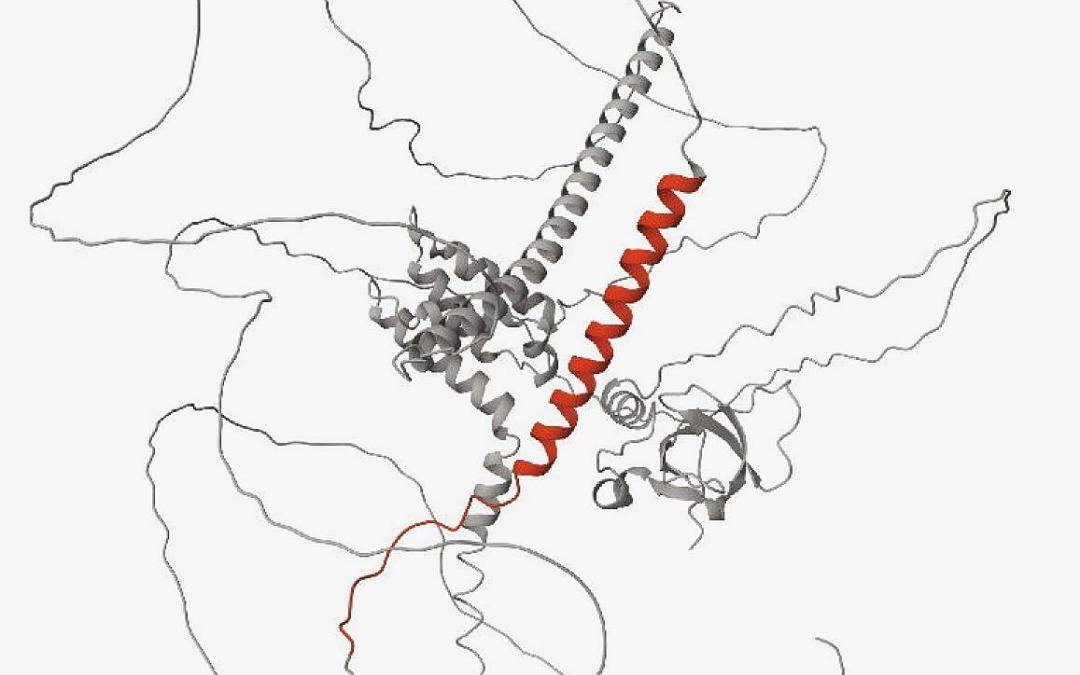

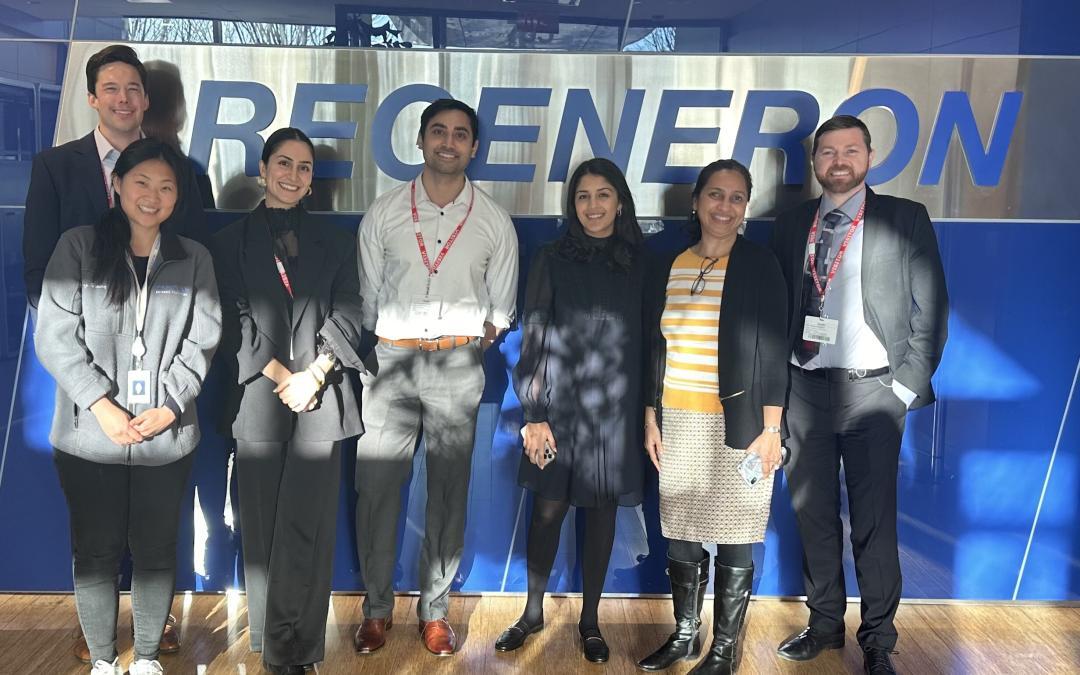
Leading Biotechnology Company Regeneron Partners with IBRA for Scholar Initiative
In a significant partnership with the International Biomedical Research Alliance (IBRA), leading biotechnology company Regeneron recently hosted an exclusive Career Development and Exploration Initiative for NIH Oxford-Cambridge Scholars in New York. The two bodies posed challenging scientific and medical queries to the participating Scholars and considered their ideas on pushing scientific boundaries.
Scholars with aspirations to forge new pathways in science and steer potential cures through the clinical process journeyed to New York. Here they visited Regeneron’s facilities and met with the alumni of the NIH Oxford-Cambridge Scholars Program who are currently based at prominent research centers including Rockefeller University, Memorial Sloan Kettering, and the Flatiron Institute.
In the course of the initiative, fourth-year Scholars John Hancock, Asmay Gharia, Sahba Seddighi, and Kritika Singh had the opportunity to meet and glean advice from program alumni like Drs. Dan Bronder, Mike Gormally, and Sonya Hanson. They shared their transition experiences from graduate students to working professionals in the science field. Furthermore, Dr. Anita Gola welcomed the Scholars to Rockefeller University for a tour and discussion session with other resident scientists.
At Regeneron, Scholars were presented with the company’s history by Dr. Susan Croll, along with information about the Postdoctoral Program opportunities. Regeneron scientists, Drs. Craig Meagher, Joe Odeochu, Sarah Ebstein, and Dylan Kwart, also gave insights into working within the biotech firm and joined a lunch session with co-founder, President, and CSO, Dr. George Yancopoulos. The visit underscored Regeneron’s unrivaled capacity for consistently turning scientific theory into medical practice, a prowess that has led to a myriad of FDA-approved treatments for a wide spectrum of diseases. The Scholars rounded off their visit with presentations of their own work and plans for possible future collaboration with Regeneron.
In summing up the visit, IBRA Director Dr. Ralph Korpman hosted a riveting cocktail and dinner party co-hosted with IBRA Chairman Mr. Steve McLean, welcoming both Scholars, Alumni, and prominent scientists and physicians, some of whom were Nobel laureates.
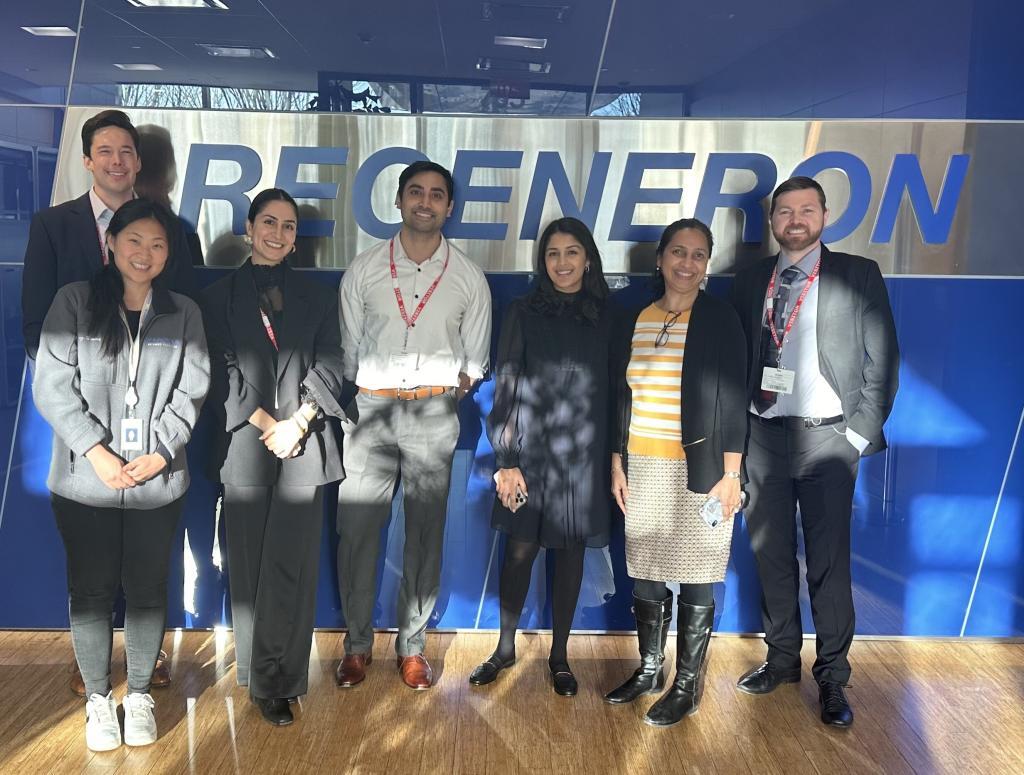
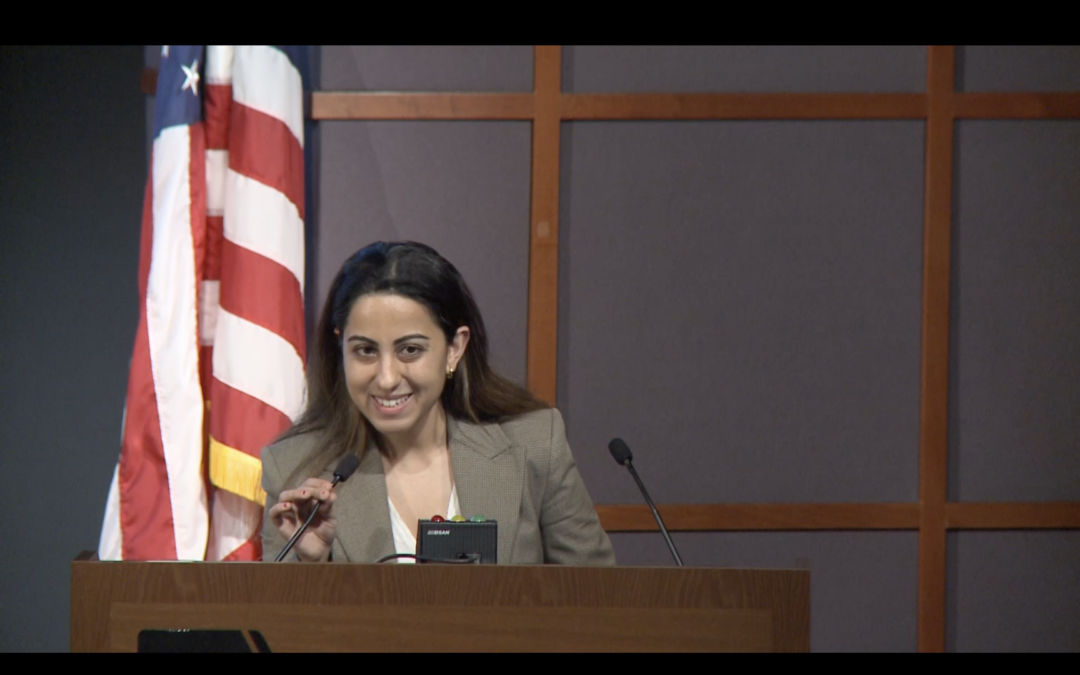
The Buzz of Attending In Person Conferences Again!
by Marya Sabir
This year marked the 30th Anniversary Celebration of the launch of the National Human Genome Research Institute (NHGRI) Intramural Research Program. This year’s annual symposium featured intramural trainee talks on diverse topics, a provider-patient session, the annual Jeffrey M. Trent Lecture in Cancer Research presented by Dr. Todd Golub (Director of the Broad Institute of Harvard and MIT), and two poster sessions encompassing 125 posters, amongst other events.
With travel award funding from IBRA, Marya Sabir, a final-year NIH-Oxford Scholar, was able to attend the symposium in person at the Natcher Conference Center in Bethesda, MD. The two-day meeting started with a choreographed dance to Dua Lipa’s “Dance The Night” (from the Barbie movie), setting a high-energy tone for the entire meeting.
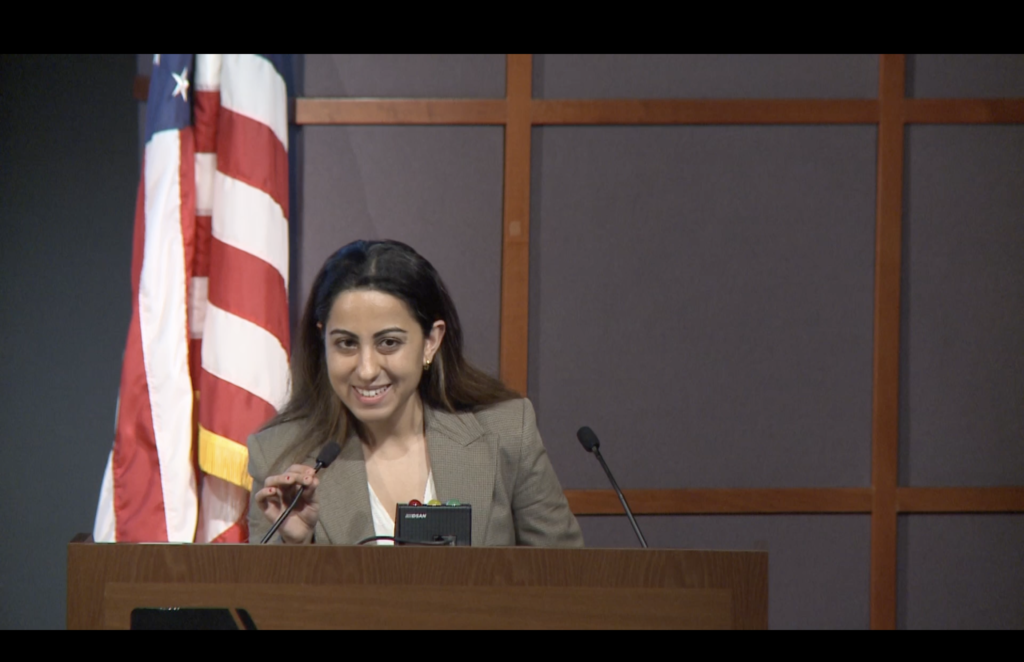
Marya was one of ten trainees selected to give a lightning talk at the symposium, describing her research using one slide in two minutes.

After the lightning talk, she presented her research describing novel mouse and cell-based disease models for a rare lysosomal storage disorder called free sialic acid storage disorder. During the poster session, she was able to discuss her work with attendees from diverse research backgrounds and expertise, ranging from postbac trainees to principal investigators. One of the poster attendees even commented that they might consider using a mouse model her team generated for their own studies in an entirely different field. She was awarded a Best Poster Award in the “Traditional Scientific” section, one of ten awardees.
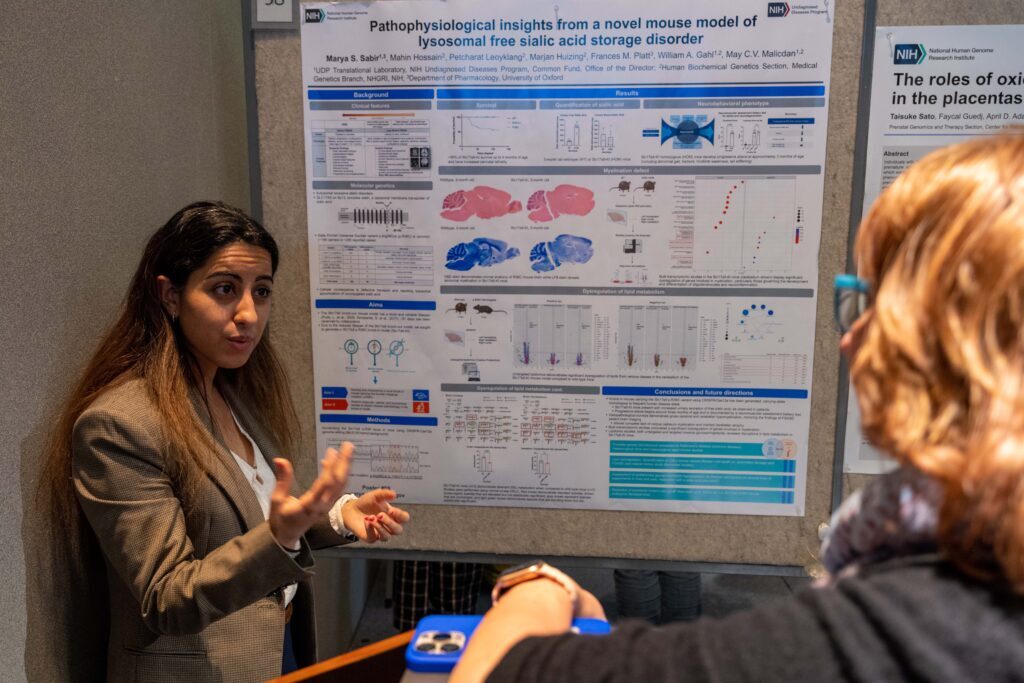
In addition to presenting her work, she and a few other trainees were allowed to participate in a trainee lunch with the keynote speaker, Dr. Todd Golub. In addition to sharing her research focus with the group, she had the opportunity to learn about Dr. Golub’s career and wise words of encouragement.
When asked about this experience, Marya expressed “Attending the NHGRI Symposium this year was a brilliant experience. The ability to interact with so many people from diverse backgrounds and expertise across the entire institute was invaluable, an experience that is difficult to recapitulate in the virtual setting. I learned about the range of work the institute does while also getting feedback on my thesis research. Thank you to the IBRA for funding me to attend this meeting which would not have been possible without their support.”
If you are interested in applying for a travel award, please reach out to Alexandra Ambrico, Director of Communication, Education, and Professional Development, at ajambrico@biomedalliance.org, for the eligibility requirements and application.
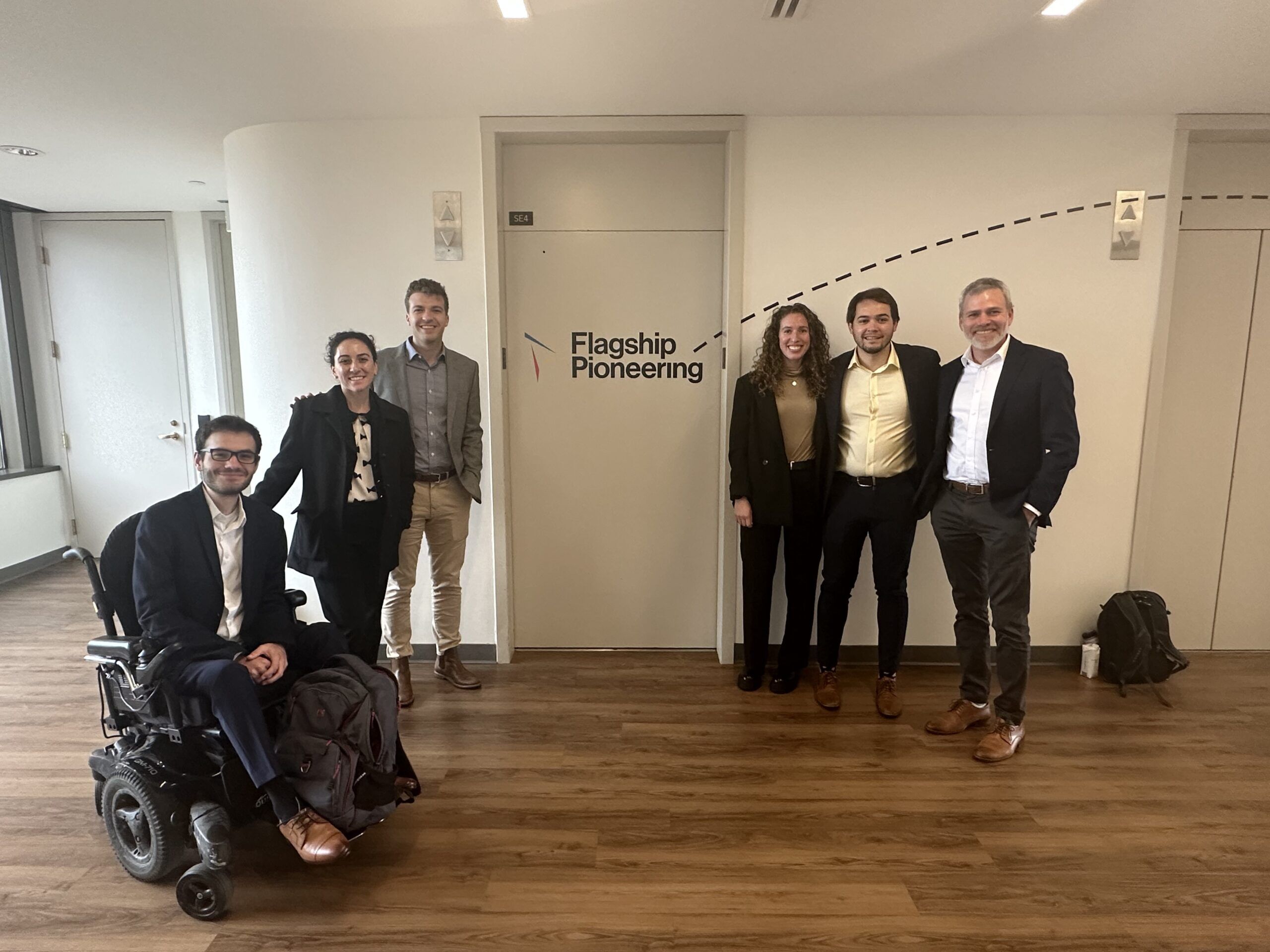
2023 Boston Career Development and Exploration Initiative
This fall, the NIH Oxford-Cambridge (OxCam) Scholars were invited to Boston, MA for a Career Development and Exploration Initiative. Scholars curious about entrepreneurship and creating the next disruptive life science startup had the opportunity to visit Flagship Pioneering. Their goal is to create, resource, and build life sciences companies that invent breakthrough technologies to transform health care and sustainability. While at Flagship, Dr. Brad Coleman provided an overview of the Fellowship Program, which offers an unparalleled opportunity to apply scientific expertise, entrepreneurial talent, and a self-starter mentality toward creating the next world-changing startups and ventures in human health and sustainability. The Scholars met with previous Flagship Fellows and presented their research to current Flagship Associates. Following presentations, Former Flagship Fellow and Associate Director, Product Concept Explorations & Clinical Development at Pioneering Medicines Dr. Krystian Kozek invited the Scholars to tour Pioneering Medicines and answered their questions about his experiences and career path as an MD/PhD.
We asked the Scholars to consider how they could use the power of data science with AI/ML, genetics/genomics, and human-based experimental models. To better understand these intersections, the Scholars visited Flagship-founded Vesalius Therapeutics. Their goal is to elegantly combine human data, genetics and genomics information, artificial intelligence and machine learning, and proprietary experimental models to redefine how we think about and treat common illnesses. Vesalius Therapeutics leadership Dr. Chris Austin and Dr. Ben Munoz provided an overview and organized a meet and greet with their scientists. Dr. Chris Austin, who served most recently as the founding director of the National Center for Advancing Translational Sciences (NCATS), shared his vast experiences through clinical medicine, academia, and industry over the last 30 years and provided insight for the Scholars.
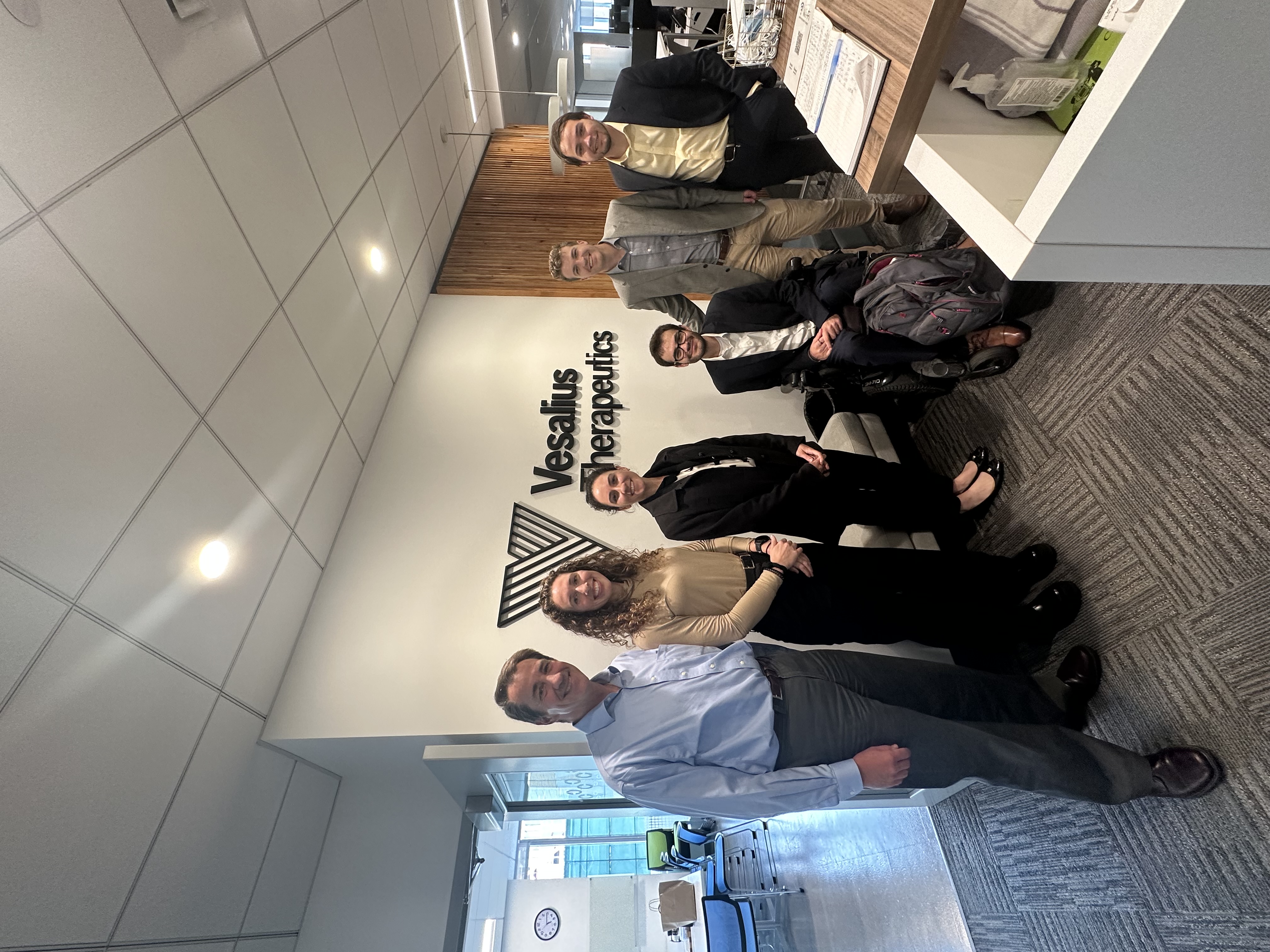
The Scholars had the opportunity to converse with NIH OxCam Alumni throughout their time in Boston. Dr. Lynda Truong, Strategy Lead at the Novartis Institutes for Biomedical Research arranged a tour for the Scholars. Drs. Brennan Decker, Michael Chen, Andrew Ishizuka, Molly Perkins, and Andrei Ramirez-Valdez chatted with the Scholars, sharing their experiences in industry, venture capital, entrepreneurship, and residency. MD/PhD Scholar Yasemin Cole and PhD Scholar Henry Taylor remarked on Brennan Decker’s reinforcement of staying connected to the NIH OxCam Program even upon graduation. Even though he graduated multiple years ago, Brennan keeps in touch with many OxCammers in Boston (not just those from his time in the Program) and has even helped several start their companies! PhD Scholar Christian Lantz shared that keeping a network of extremely impressive people will only help in the future!
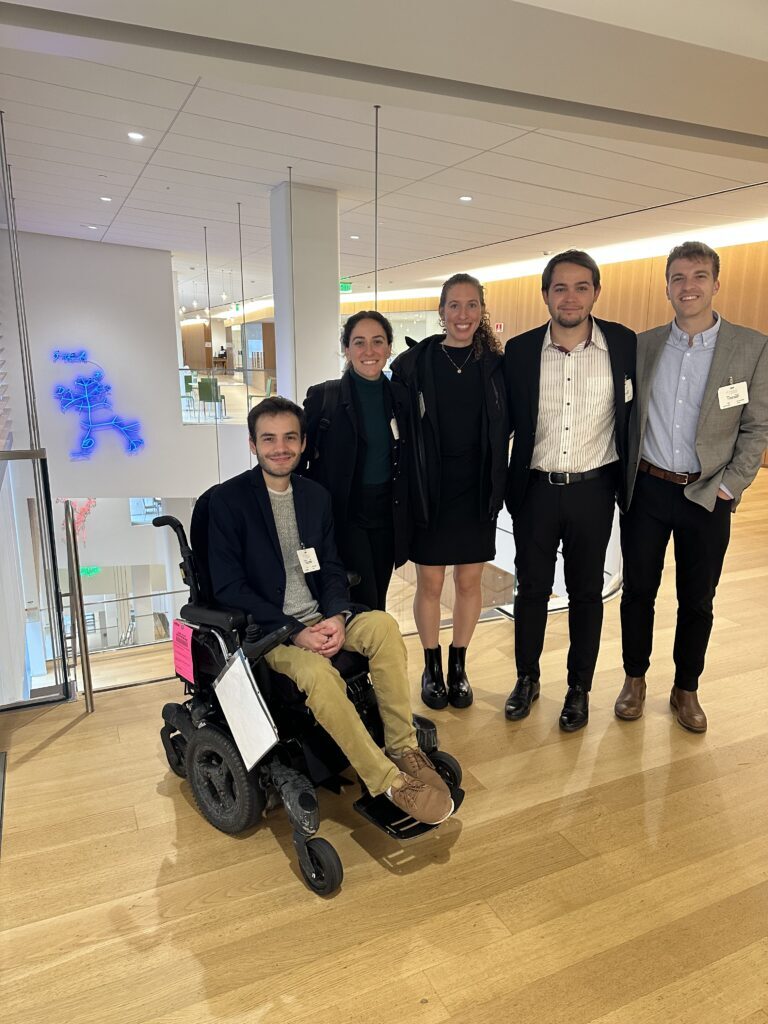
Alumnus Dr. Stan Wang, CEO & Founder of Thymmune Therapeutics, a biotechnology company developing a machine learning-enabled thymic cell engineering platform to restore normal immune function in aging and disease, met with the Scholars at LabCentral, a first-of-its-kind shared laboratory space designed as a launchpad for high-potential life-sciences and biotech startup. MD/PhD Scholar Dalton Hermans shared, “Meeting with Stan was a highlight of the trip for me. I feel, as an alumnus of the program, the tone of the conversation was a bit more candid. For that reason, I feel we learned a lot more about the technical aspects of start-up. I wrote down something Stan said that I have been thinking a lot about ever since, which is essentially, ‘In academia, scientists start with a solution that they have come up with and try to apply that to a disease and/or problem they can use it for. In biotech, scientists start with a need and/or problem for which there is a current therapeutic or economic gap and then try to come up with a solution to that need and/or problem.’ PhD Scholar Ray Smith remarked on the opportunities to learn about the intersection of biotech and academia and appreciated the range of experiences of the Alumni throughout the trip.
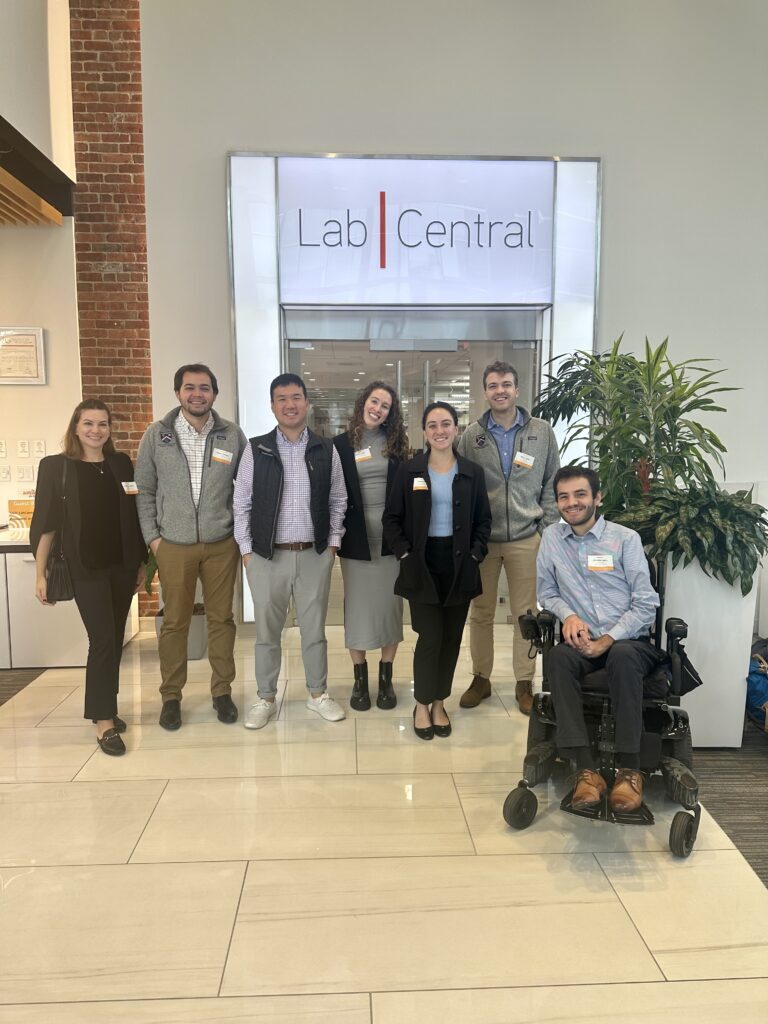
The International Biomedical Research Alliance is committed to providing Career Development and Exploration Initiatives to Scholars in the NIH Oxford-Cambridge Scholars Program. These initiatives aim to ignite Scholar thinking around career opportunities where they can play a key role in the future of biomedical research enterprise. Please contact Alexandra Ambrico, Director of Communication, Education, and Professional Development, at ajambrico@biomedalliance.org if you would like to be involved in hosting future exposure visits.
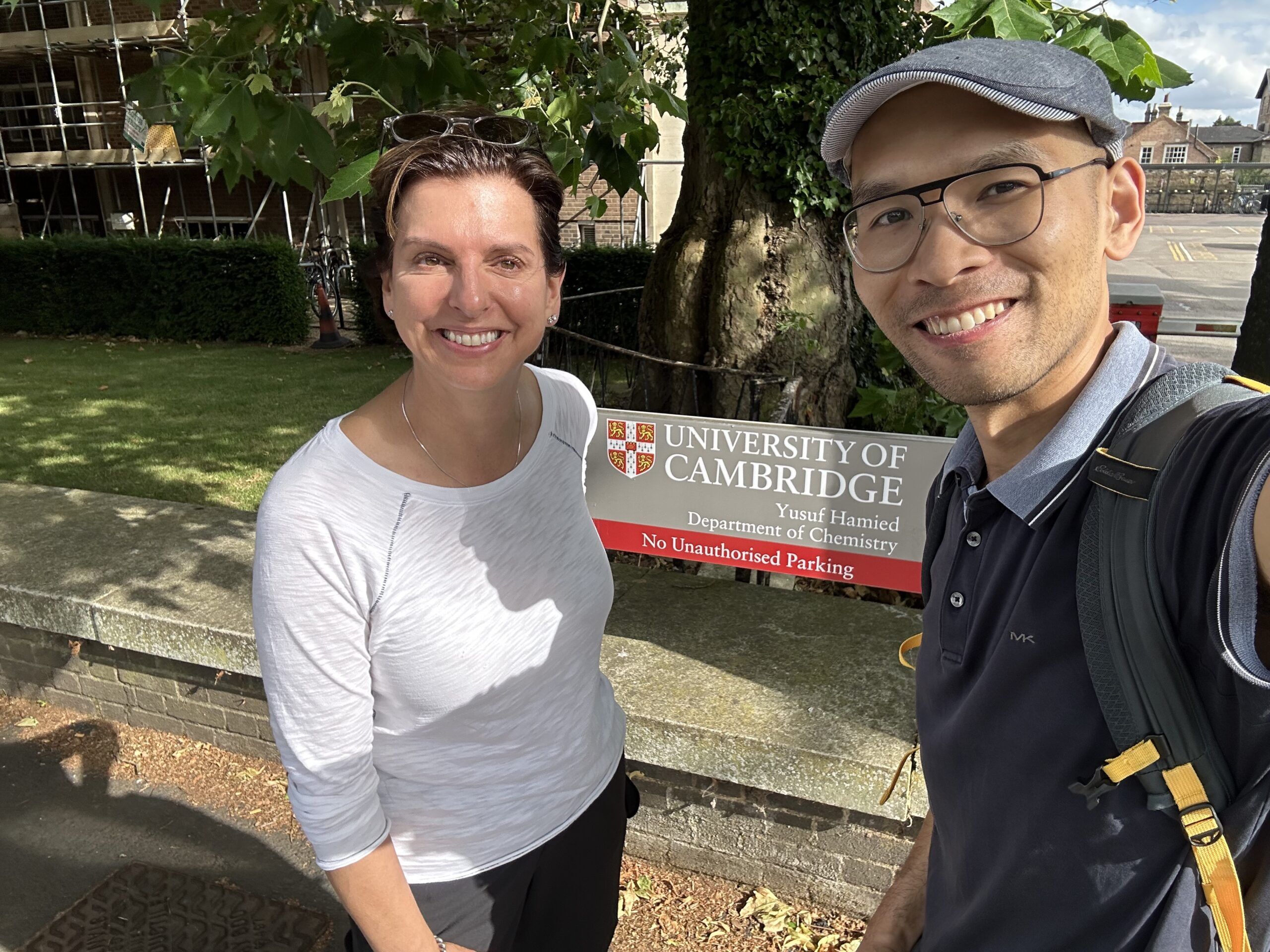
NIH’s Dr. Elodie Ghedin Named 2023 Outstanding Mentor
Acclaimed American poet, educator, activist, and autobiographer, Maya Angelou, once said that in order to be an effective mentor, one must care. She went on to say that an effective mentor should care about what they know, and care about the person they are sharing it with.
A mentor is many different things on different days but is always endlessly interested in the quality of the learning experience and the well-being of their mentee. In short, they care.
It has been a long-standing tradition of the NIH Oxford-Cambridge Scholars Program to pause each year to recognize an outstanding mentor among the many faculty members who serve the Program across the NIH, and at the Universities of Oxford and Cambridge. Nominations for this honor come from those who are the fortunate recipients of outstanding mentoring – the mentees.
Dr. Elodie Ghedin is the Chief of the Systems Genomics Section at the National Institute of Allergy and Infectious Disease and is also our incoming Co-Scientific Director of the NIH OxCam Program. She was nominated by her mentee, Tung Nguyen, who shared the following sentiments.
“Elodie Ghedin has been a rare and considerate mentor who has helped me professionally and as a person. She responds within seconds of a message and has provided resources in data, online courses, and publication and conference presentation opportunities beyond what I had expected for my first year. She is the type of flexible mentor where if I have a wild idea, she can contact the right people for me to test it out.
I feel like a student with autonomy commensurate to that of a young investigator, sharing my boss’s excitement to pursue data-driven leads and temperament to dissect unexplained patterns. Importantly, this patience has led to discoveries and further hypotheses for SARS-CoV-2 genomic interpretation. I am establishing my own network through my OxCam affiliation across disciplines and conferences in part due to Elodie’s openness to maximize my education. My boss engages me with two-way dialogue and has provided unique resources for me to reach into the field of viral genomics and public health during the COVID-19 pandemic.
It has been a privilege to be directly mentored by Elodie Ghedin, and to call her my mentor, boss, and friend. It is an honor to nominate her for this award.”
Congratulations Dr. Ghedin!
Exceptional mentorship continues to be a cornerstone feature of the NIH Oxford-Cambridge Scholars Program since its inception in 2001.
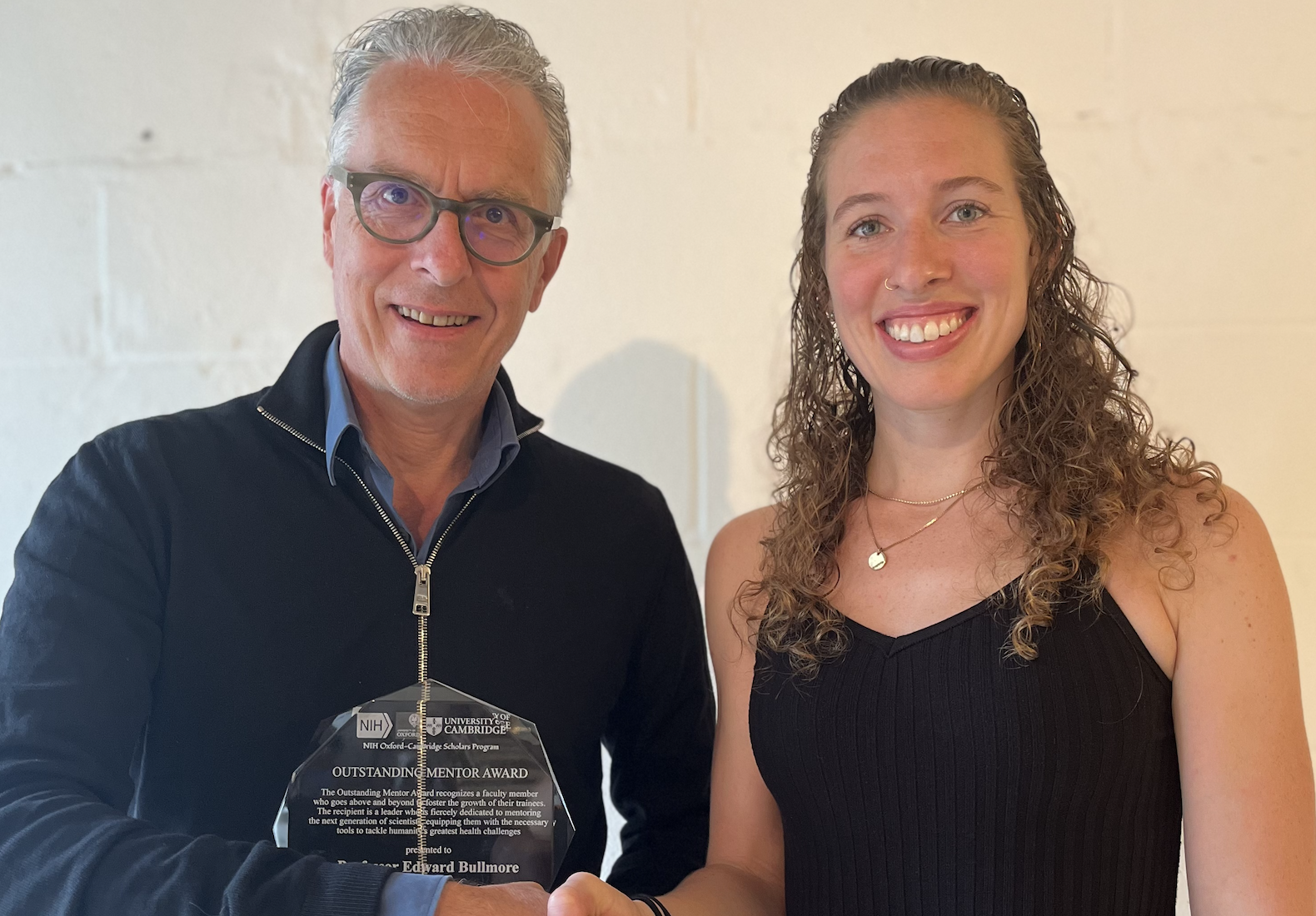
University of Cambridge Professor Ed Bullmore Named 2023 Outstanding Mentor
Acclaimed American poet, educator, activist, and autobiographer, Maya Angelou, once said that in order to be an effective mentor, one must care. She went on to say that an effective mentor should care about what they know, and care about the person they are sharing it with.
A mentor is many different things on different days but is always endlessly interested in the quality of the learning experience and the well-being of their mentee. In short, they care.
It has been a long-standing tradition of the NIH Oxford-Cambridge Scholars Program to pause each year to recognize an outstanding mentor among the many faculty members who serve the Program across the NIH and at the Universities of Oxford and Cambridge. Nominations for this honor come from those who are the fortunate recipients of outstanding mentoring – the mentees.
Rachel Smith nominated Professor Ed Bullmore, of the University of Cambridge, stating “I am endlessly grateful for Ed taking a risk on me 2 years ago, when he agreed to work with me as a student though I had no experience in the field and big ideas with no solid foundation or background knowledge. As an extremely successful, end-of-career scientist he has every reason to fulfill the stereotype of the busy senior professor who is scarcely familiar with his students’ work. However, this could not be further from reality – Ed’s fierce dedication to mentorship is shown not just through the time and intellect he invests in improving his students’ science, but in getting to know us as people as well. When the other two PIs associated with our lab went on maternity leave around the same time, he intentionally cleared out time in his busy schedule to meet with all students in the group, including those whom he was not the primary supervisor for, one-on-one. I get genuinely excited for every one-on-one with Ed because I know talking with him will bring clarity and direction to my work, and I leave those meetings feeling better about life in general. He is funny, kind, and inspiring, and his guidance has helped me believe in myself and my science in a way I couldn’t have imagined even a year ago. I doubt he knows it, but Ed’s mentorship over the years has opened me up to a world of scientific possibilities that people from my background are not often exposed to, and I cannot overemphasize how grateful I am for that.”
Exceptional mentorship continues to be a cornerstone feature of the NIH Oxford-Cambridge Scholars Program since its inception in 2001.
